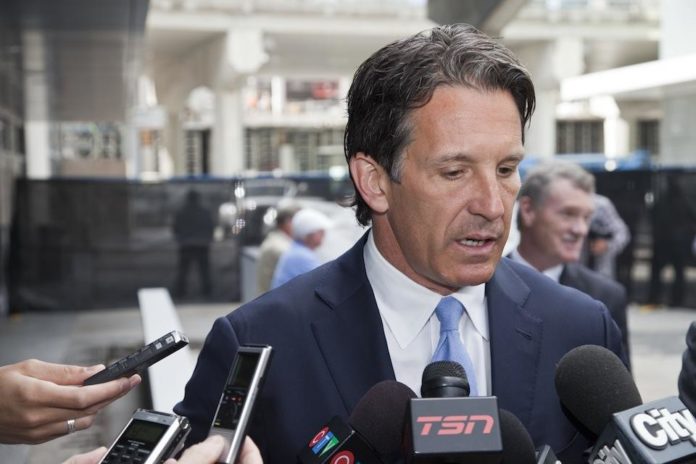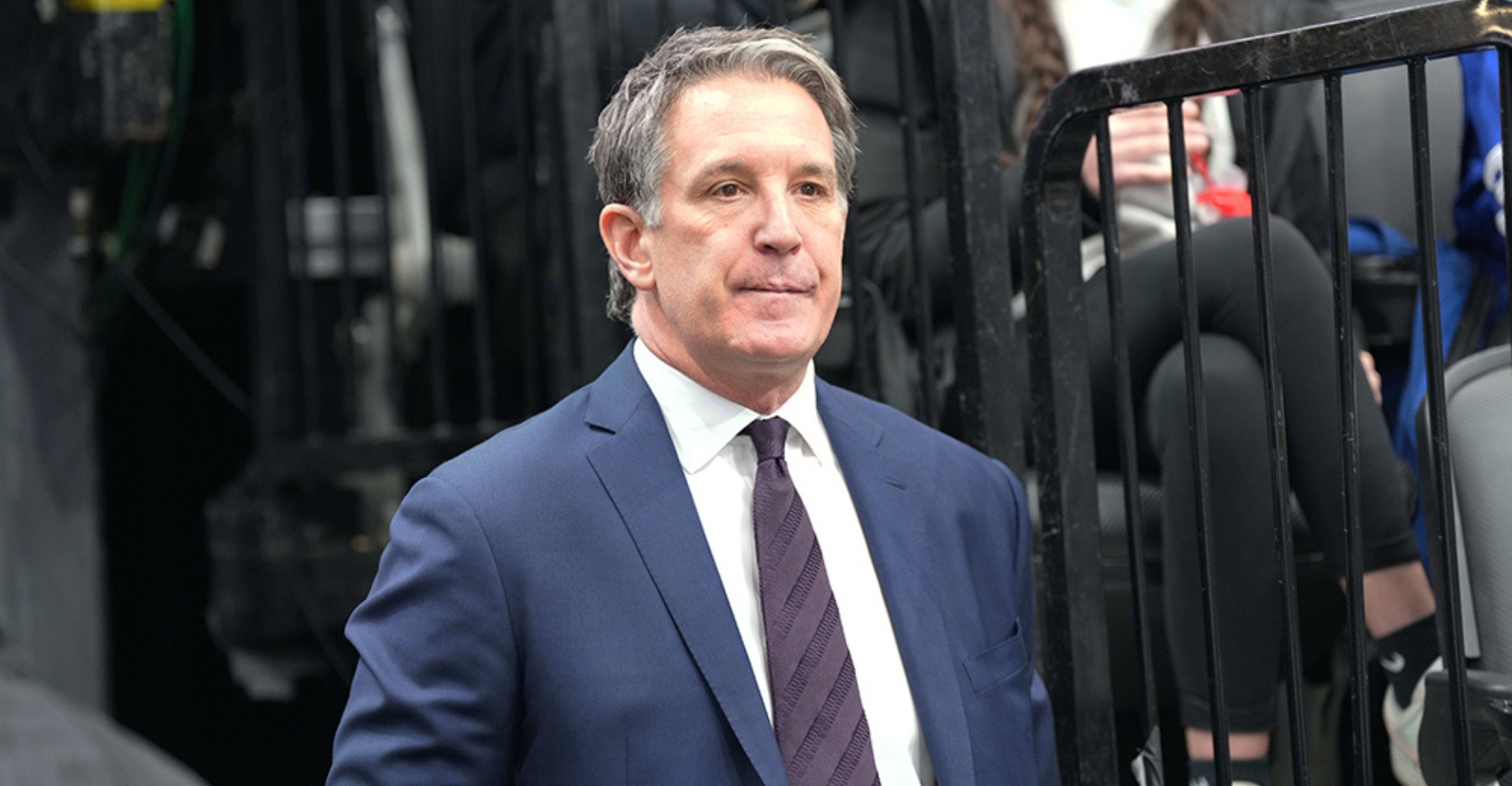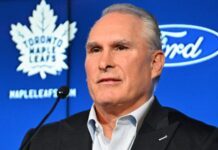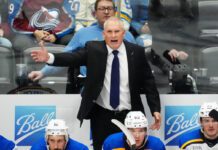
After announcing GM Kyle Dubas’ departure from the organization earlier today, Maple Leafs President Brendan Shanahan addressed the media to discuss the timeline of events that led to Kyle Dubas’ exit and what he is looking for in the next General Manager of the franchise.
Opening Statements: The timeline of Kyle Dubas’ departure
Shanahan: First off, I apologize for conducting this on a Friday at 3 p.m. in front of a long weekend.
Before I get started on a timeline here, I thought it was really important to say at this point that I want to thank Kyle Dubas for the nine years that he has given to this hockey organization and all of the tremendous contributions that he has made to the Toronto Maple Leafs. He has been a fantastic employee and a fantastic person the entire time.
The timeline on the Kyle Dubas contract — I suppose you could go back to last offseason. I approached Kyle in his office at the Ford Performance Center and explained to him that he would be not receiving a contract offer prior to his final year of his contract. I tried to reassure him that it wasn’t a reflection of his future with the club. I reminded him that it was a situation I found myself in a few years prior as well and that it was my hope and my intention that after the end of the year — after being judged for the full five years of his contract — we would be extending him and moving forward.
Kyle took it very well. I thought he was a pro. He addressed that in his opening season statements — that he was comfortable with that. I thought he had done an excellent job.
I thought Kyle had a great offseason. We had some difficult choices to make. If you are judging him on the work that he did last summer, some of the decisions of letting players go and signing some players — it is a challenging job for any GM, and I thought Kyle did an excellent job. We came into the season very well-organized with many options. I thought the team had a typical season of highs and lows but had an excellent regular season.
Going throughout the year, the way that the team was managed — I had no issue with that, and I thought Kyle did an excellent job.
The trade deadline… Again, going back to his process and the way that our team does business under his leadership, there is a lot of input. I thought he made some very good moves. I thought he had prepared the team to the best of his ability, as any GM can do. After the trade deadline, there is not as much for a GM to do.
Shortly after the trade deadline in the middle of March, I approached Kyle in his office at Ford Performance Center. I told him that I had seen enough in my mind that I had wanted him to be our GM going forward, but he should take some time and think about it. If he was comfortable with that idea, I would start talking to ownership about that.
Kyle appreciated that. We had a good relationship the whole year. That day was nothing different. He came back to me about a week later and said he was comfortable moving forward. He gave me the name of his agent — or said his agent would reach out to me — but that he didn’t want it to be a distraction for him. I respected his wishes that I wasn’t going to discuss it with him any further at that point.
Fast forward to the end of the season, getting through the end of the regular season and the playoffs, I had many good conversations with Kyle’s agent. I felt we were making progress. I wanted to be in a position to, A) respect Kyle’s wishes and not discuss with him as it was going along, but I knew his agent — from time to time — was giving him updates. It is really up to them. I don’t know exactly what was going on there.
I felt those conversations, which were productive, had put me in a position that when the season ended… Or even if it was between rounds, at a certain point, I felt as if — however round two ended, even if we were moving onto round three — it was something that needed attention now. I felt that those conversations and the communications I had gotten from Kyle had put me in a position where I could come to him with something that was pretty much a finished deal and reflected what he wanted financially and what he wanted as a GM and what was important to him.
When the season did end — unfortunately, abruptly — it was really important to me that I was ready to go early. I had expressed to Kyle that night that as disappointed as we all were, I thought he had done a good job. It is a tough time for the players. It is a tough time for management. It is a tough time for all of us. It is a tough time for Maple Leafs fans in those moments after a loss.
But we had a day off on Saturday, we communicated a little bit through text on Sunday, we had a team photo here, we went up to my office, and I had another good conversation with Kyle. I presented him with what I thought was a framework that reflected what his agent and I had talked about and had gotten to a good finishing place in the effort to get this done as soon as possible. Kyle took it. He seemed fine or seemed pleased to receive that news so quickly. We then talked about the hockey team for another couple of hours, and then we went home.
We knew the next day that we were having exit interviews, physicals, and media. We talked a little bit about doing media. I had expressed to him that it was not my intention to talk to the media until I had something settled with him. I expressed that I thought it was maybe a good idea if he didn’t, either, but Kyle said he really wanted to talk to the media. I respected that. He felt that as the players and coaches were speaking, he should as well. I respected his wishes.
Let me go back. Part of my conversation in my office was that this was hard on his family, in fairness. We talked about that. Quite frankly, it is hard on all of our families. It is a difficult thing. It is hard on the players and the parents. But is the job we choose. It is the sport we choose. We are very fortunate to be in it, but it does not come without a toll on the families. I completely acknowledge that. We talked a little bit about that.
The next day, though… While watching Kyle’s press, I think at that point, there was a shift in my thinking — a dramatic shift in my thinking in that moment as I drove home that night. As Kyle expressed, he might not want to be our GM. I have to take that very seriously.
As I said to him the day before, I understood those feelings, that pressure, and the pressure that players, management, coaches, and family members are under. But it was a very real possibility to me at that point that I would be needing to look somewhere else. As part of my job, that is what I began to do while still hoping that Kyle and I could come to some sort of a resolution.
In the next few days, I didn’t get any more clarity. On Tuesday, Kyle and I did not meet privately. On Wednesday, we did meet privately and discussed this again for a long time. I had probably more questions than answers. I did not have clarity. It further made me feel that there is a strong possibility that — and it’s anyone’s right to do so — he might not want to be the General Manager of the Maple Leafs. My focus continued toward the path of, “What do we look like next year with a different GM?”
On Thursday — the next day — Kyle had said that his agent was going to call me and that he would reach out to me as well. I got a call in the afternoon from his agent. Basically, a new financial package was presented to me by the agent. The conversation was brief. I did not hear from Kyle throughout the day. I went home, and just before dinner time, I got an email from Kyle saying that he did want to be the GM of the Maple Leafs.
At that point, if I am being honest, I had gotten to a different place about how I felt about the future of the Toronto Maple Leafs and what was best. As hard as it was and as hard as it is to make a significant change to somebody that you are close to and have been working with for nine years… Well, a gap had risen within the contract status, but nevertheless, with the email that I received from Kyle, I just felt differently. I felt that the long-term future of the Maple Leafs might have to change.
I slept on that, woke up this morning, and drove to Kyle’s office at Ford Performance Center. I informed him that we were not going to be renewing his contract. That is where we are here today.
I am happy to answer the questions that I can. My focus now is to immediately begin the pursuit of interviewing candidates for being the next General Manager of the Toronto Maple Leafs.
Q&A

From your side of things, do you think this broke down entirely over money?
Shanahan: No, I wouldn’t characterize it as breaking down over money. Knowing and recognizing on the Monday after the availability… Look, when a GM is playing out the last year of his contract, there is always a possibility of a contingency that you might need a new GM. He might choose to go to another team. I felt I had gotten a little bit closer and got some indications that we were going to work this out.
After the press conference on Monday, I was less sure. I thought there is a real possibility that he might not want to do this. He might need to — as he said — take a step back. At that point, I hadn’t ruled Kyle Dubas out, but I certainly had to make sure I was thinking of other options as well.
How much of the decision was yours alone versus getting input from the board and ownership on letting Kyle Dubas go?
Shanahan: I think in any organization — ours is no different — on decisions as big as this, it is something you communicate with your bosses. This was ultimately my decision. They were supportive, but ultimately, that is my job. It is my job to make recommendations to them. That was my recommendation and decision.
You mentioned that you could’ve signed Kyle Dubas last summer. What is the level of regret that it didn’t get done and you instead entered the year with a lame-duck GM, for lack of a better term?
Shanahan: I think it is more common than people realize. Players go through it. Management goes through it. Coaches go through it.
It is not ideal, certainly, but I thought that was why it was very important to be very communicative with Kyle throughout the year. I tried to be as supportive as I could throughout the year — and also go to him as soon as I thought that it was fair to go to him after the trade deadline and say, “If you are comfortable doing this — and take your time to find out if you are — I want to start going to work on getting this done.”
This was so that it would not be something on his mind going into the playoffs. I felt he had put the team in a position to have success. It was important to me to not just wait and see what the result was but to be consistent not with just the support I try to give him on a daily basis but also have something tangible to present to him in the form of a verbal commitment by me and subsequent conversations with his agent — which went well.
On Monday, when Kyle Dubas left the door open to not returning as Leafs GM, was that news to you that it could be a possibility?
Shanahan: I think we discussed the day before that it was a concern for me. I didn’t expect that he was going to go out and put that to the public, but nevertheless, it made it all the more real and all the more serious. Certainly, it presented lots of questions.
I have no issues with Kyle’s honesty or Kyle’s emotions. I think Kyle is an honest person. As I said, I have been in this game a long time. We have all had these experiences where we see — whether as a player or as management — how this can impact your children at school or your family. I want to be very empathetic and understanding. I know and understand that it is a very real thing — not just in Toronto, and not just in the sport of hockey, but really, everywhere.
I do think it is a massive privilege to be able to play or work in the NHL, but that is not to [understate] how difficult it is for all athletes in all cities — and management as well.
Nine years later after hiring Kyle Dubas, what can you say about where it ended up? How disappointing is it to you on a personal level having put your neck out for him in the past?
Shanahan: When you are in a position where you have to have that conversation with people, on a personal level, it is difficult. You know their families. It is a difficult thing, but it is part of the job. It is part of the responsibility that you take on.
I don’t see Kyle coming here as a failure at all. Kyle was instrumental in where this organization is today. I have to think about how we get where we want to go in the future — what are the best ways for us to be better? What are our new ideas and thoughts?
From that time back in 2014 to now, it is a journey — not just for Kyle but for other people who are along for other parts of that journey. If we finally get to — and we are determined to — where we want to get to, those people will all have their fingerprints on that journey and will be major contributors.
That makes me not just thankful for Kyle but a lot of the people who were important along the way.
Kyle Dubas mentioned that had he continued, he may need to alter his plan. What was your takeaway from the way the season ended? What do you see as needed to help this group over the hump?
Shanahan: I don’t want to get ahead of that. I want to speak to new candidates. I certainly have some thoughts and opinions, but the way that it has always worked here — whether you are a President of the team or a pro scout — is that we have a very sort of open atmosphere where people can state their opinions to the GM, and the GM makes decisions. That is the way it has been. That is how I expect it to be going forward.
We want to support the GM. The GM, the coach, and the players are forward-facing the most. The most pressure is on them. When it comes to that, what I took from Kyle’s comments is that they were accurate and honest. Without making any promises, we will look at everything in the organization and try to make decisions that will make us better.
That might be not on the timeline that everyone wants. It might not occur just this summer. It might occur during the season. It might occur at the next trade deadline. But just being different doesn’t solve something.
Removing Kyle from the position of GM isn’t the solution. It is finding something that is a better fit that is a solution. It is the same on the ice.
I think that is what Kyle was saying, and I don’t know how you argue with that. If we find a way to make an improvement on the ice, we have to explore that. It wasn’t directed at any one player or any one position or any job specifically. We are — every single year — looking to get better. Sometimes, we are successful, and sometimes, we are not, but that is always the goal.
You said you realized at one point that the future of the Maple Leafs had to change. Does that mean you look for a different kind of GM — a person with a different kind of vision for the team? What are you looking for in your next GM?
Shanahan: I am going to be open-minded to who that person can be. I want to be open-minded to all candidates. Certainly, having an experienced GM would be an attractive quality.
Are there any other personnel decisions you are going to make between now and hiring a new GM, or are you going to let a new GM handle that?
Shanahan: I have spoken with most of our staff. I have called several of our players. I have another call with more staff members after I am done here.
Some of those decisions have to be the responsibility of the new GM. In the meantime, I am going to lean heavily on Brandon Pridham and we are going to get through this time.
I have had a great conversation with Wes Clark about the upcoming draft. We have built something here. There are a lot of people who are shocked and saddened today. It would be a little strange if it wasn’t that way. But there are also a lot of people here that are coming back to work, doing their jobs, and getting ready to do the things that they are paid to do. That was encouraging.
As far as any sort of big, major decisions, the biggest one is finding a GM. There is an urgency to do that. I don’t think it needs to be rushed. I want to really say that I am not going to do it in a hasty way. I want to be very thoughtful and thorough. But I do think it is a priority, and it needs to happen rather soon.
Is Brandon Pridham a candidate in your search? You have the draft, and you have contract negotiations with William Nylander and Auston Matthews with deadlines coming up. How difficult is it to spread around those responsibilities knowing they can’t wait for a prolongated process to find a new GM?
Shanahan: I am not ruling anybody out at this point. We will have all of those conversations. I have told you about some of the things that would be attractive to me, but I am not ruling out any possibilities in a future GM.
We have to get to work. Brandon is a great example of a guy who has excellent relationships with agents, players, and getting ready for the draft. We have a staff in place. We have a staff that certainly feels wounded today, as we all do and as we all should. But we also have a staff that is professional, ready to do the job, and prepared to do the job.
Hopefully, we find a GM as soon as possible — someone that fits what we are looking for and can help the Toronto Maple Leafs get to the next level.
As we saw this year, the goal wasn’t just to get past the first round and everything gets easier. When you get past the first round and you lose a very closely-fought series in the second round, it is devastating, as it should be. It is hard. People are impacted and affected. But the reality is that it doesn’t get easier in the third round. It doesn’t get easier by going to the Finals. There is only one team that it is easy for at the end of the year — the winner.
We learned this year, by successfully getting out of the first round, that there is no nice summer or finish line just for having partial success. Quite frankly, what we have learned here as a group — many of them for the first time — is that the second round doesn’t make it feel better.
The news that is coming if we are lucky enough to keep improving and getting better is that it only gets harder. The pressure only mounts. The ability to make decisions under pressure only gets harder as you get to the third round and the fourth round. Your decisions are more impactful and have more of an impact on the fan base as you get deeper into the playoffs.





























![New Leaf Anthony Stolarz on the opportunity in Toronto: “In Florida, I knew my role as a backup… Now, [Joseph Woll] and I are competing for starts… As a goalie, that’s all you can ask for” Anthony Stolarz, Stanley Cup win, now Maple Leaf](https://mapleleafshotstove.com/wp-content/uploads/2024/07/anthony-stolarz-sc-100x70.jpg)
